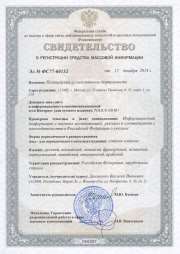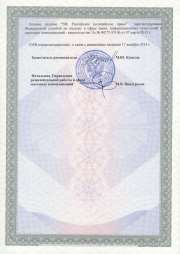MAIN PAGE
> Journal "Police and Investigative Activity"
> Rubric "The issues of interaction between police and other law enforcement authorities and institutions"
|
The issues of interaction between police and other law enforcement authorities and institutions |
|
Bobrenev V.A. - About the Balance Between Functions and Directions of Prosecution Service in the Russian Federation
|
|
pp. 1-8
|
DOI: 10.25136/2409-7810.2017.4.24381
Abstract: The article is devoted to the issues of the balance between functions and directions of prosecution service in the Russian Federation. The author systematizes positions on the matter presented in the theory of prosecution science. Bobrenev also describes reasons of its existence, shares his own point of view on the matter and offer a list of functions and directions of prosecution activity in the Russian Federation. The subject of the research is the provisions of the Federal Law 'On Office of Public Prosecution', legal acts of the General Prosecutor's office and academic literature on the matter. The methodology of the research involves general research methods such as analysis, synthesis, induction, and special research methods (formal logical and historical law methods). The author of the article concludes that we can actually talk about functions and directions of prosecution service as part of the applicable legislation system, provided that there are not identical terms. Prosecutor's functions are fiexed in federal laws that define the general mission, purposes and objectives of prosecutor's activity. Directions of prosecution activity is a component of a function that is characterised with a certain subject matter, tasks, powers and legal means as well as form of organisation.

|
Tahirov Z.I. - The Model for Assessing the Final Socially Significant Results of the Activity of Law Enforcement Bodies and Other Actors of the Law Enforcement System from the Position of the Network Approach (the Case Study of Organizing the Activity of Police in the Countries of the European Union)
|
|
pp. 27-41
|
DOI: 10.25136/2409-7810.2018.1.2326
Abstract: In this article, within the framework of the model of network law enforcement activity, the author's systematic approach to assessing the effectiveness of the domestic law enforcement system is described: judicial, prosecutorial, human rights and law enforcement activities. The aim of the work is to establish organizational and legal contradictions between the actual model for assessing the activities of law enforcement bodies on the basis of quantitative indicators and demonstrated qualitative socially significant results of such activities. The objectives of the work are to determine the contribution of law enforcement agencies and other law enforcement agencies to assessing the effectiveness of all law enforcement activities on the basis of their inherent place and role in the structure of such activities; to describe typical features of the modern model of law enforcement assessment; to search for ways to optimize the effectiveness of law enforcement; to model the author's system of evaluating the final socially significant results of the activity of law enforcement bodies and other subjects of the law enforcement system from the perspective of the hypothesis about the network character of modern social relations. The article is based on the analysis of the legal provisions, theory of social management, cybernetics, and information analysis. In his research Tagirov has applied general and special legal research methods that ensure the principles of historicism, integrity of regulatory and procedural institutional analysis of final socially significant results of law enforcement activity. The author has also applied the methods of abstraction, dialectical materialism, economic determinism, legal interpretation, analysis and synthesis, structural logical method, cause-and-effect relationships, and modelling; the principles of development the research subject and its logical and structural certainty, dialectical connection between historical and logical research styles, consistency and systematicity of the research; general scientific approaches to the subject under research including operational approach, personality - activity approach, collective activity approach, axiological, historial, conflictological approaches, the norm and anomaly approach, communicative and other research methods and concepts used in modern social studies and humanities. The novelty of the research is caused by the fact that the author of the article makes a hypothesis about about the network structure of the society. The rationale of the research is determined by the orientation at building a digital economic system offered by the President of Russia, in particular, that as an essential element of keeping up with other major countries in the global world. For this purpose, the author of the article offers his own model of network law enforcement activity that does not contradict to the digital economy model but serves as an essential part and law enforcement sphere of the state management typical for social relations of the future. As a result of his research, the author of the article concludes that law enforcement activity of a state as a social and economic model has the nature of the compromise between targets of the social system, law enforcement mechanisms, and associated expenses. As any other cybernetic system, efficiency of law enforcement activity can be regulated by the methods of optimality modelling; elements of the cybernetic law enforcment system and their efficiency are interrelated and interdependent, thus, it is impossible to assess efficiency of a law enforcement actor disregarding mutually coordinated activity assessment; and shift to mutually coordinated law enforcement activity through establishment of interdepartmental and interlayer (network) cooperation is a natural and inevitable consequence of the social environment development. The article presents the results of the research fully and precisely giving preference to new research results and long-term data. Some critical remarks made by the author contradict to currently used methods of assessement of law enforcement activity and thus play an important practical role for integral, full and independent research of true efficiency of the law enforcement system.

|
Sushkin N.V., Azovtsev E.M. - The Problem of Interaction Between the Ministry of Internal Affairs of Russia and the Ministry of Emergency Situations of Russia During Inspections on Fires
|
|
pp. 31-41
|
DOI: 10.25136/2409-7810.2022.3.38655
EDN: NTUZMD
Abstract: The object of the study is the mechanism of interaction between the investigative units of the internal affairs bodies and the investigation units of the Ministry of Emergency Situations of Russia at the initial stage of conducting a procedural check on the fact of a fire, identifying shortcomings in the organization of this interaction and finding ways to solve the identified problems. Crimes related to fires are under the jurisdiction of both the investigative units of the internal affairs bodies and the bodies of inquiry of the Ministry of Emergency Situations of Russia. However, in the vast majority of cases, when a fire is reported, it is not known whether a criminal act has taken place, and, if so, what is its qualification, based on which the body authorized to carry out a preliminary investigation. In practice, this leads to excessive bureaucratization of the process of procedural verification, unjustified repeated transfers of verification material from body to body, inconsistency of the initial verification measures and partial duplication of the work carried out. The scientific novelty of the study lies in the fact that the attention of the authors is not focused on the issues of the methodology of fire investigation, but on the organizational aspects of this process that affect the efficiency of solving crimes of this category and preventing the occurrence of such a problem as the loss of criminally significant information, the result of which is extremely low efficiency of the process of disclosure and investigation of crimes with increased labor costs. Based on the results of the work carried out, significant problematic issues related to the conduct of initial investigative actions on the fact of a fire have been identified, and solutions have been proposed to improve the effectiveness of solving crimes related to fires

|
Saidov Z.A. - Administrative Regulation in the Private Sector
|
|
pp. 45-56
|
DOI: 10.7256/2409-7810.2016.1.16093
Abstract: The article focuses on the problems of legal and organizational measures related to the administrative regulation of the non-state sector of economy. The author has conducted a theoretical and legal analysis of the concepts of legal regulation of economic relations in the private sector of the economy from the viewpoint of its administrative regulation. The author also discusses the researchers' positions on the concept of state regulation of economy. The main attention is paid to developing methods and methodology of administrative regulation of security of economic relations. In addition, the author of the article presents a theoretical and legal analysis of the concepts of development of law and economics under current conditions. Saidov also analyzes different position concerning the interpretation and legal regulation of these categories. The methodological basis of the article includes recent researches on the theory of knowledge. In the course of the study the author has applied general philosophical and theoretical methods (dialectics, systems approach, method, analysis, synthesis, analogy, deduction, observation and modeling), traditionally legal methods (formal logic) as well as methods used in concrete sociological research (statistical, expert evaluation, etc.). The main conclusion drawn from the results of the study is that at the present time to ensure law and order in economy it is necessary to improve forms and methods of administrative regulation in the private sector. The main contribution made by the author of the article is the need for the development of administrative regulation in the private sector. The novelty of the research is caused by the fact that the author has developed proposals for the development of forms and methods of state regulation of economy and discussed legal and institutional guarantees for the rule of law in the economy of our country.

|
Vinnikov A.V. - Language Studies, Law and 'Definitions'. On Linguistic Issues of Justice and Society
|
|
pp. 47-134
|
Abstract: Linguistic issues of justice include problems with judicial and police translations, secret speeches when national languages are used and the tendency towards denial of law and 'life according social standards' as the society starts to speak slang more. The author of the article carries out a comparative analysis of institutions of police officers and translators in Russia and developed foreign countries. All over the world the law allows to use translation services conducted by any physical entities speaking a foreign languae. Sworn, certified and licensed translators whose participation is not required by the law sabotage the split in the system of law enforcement. At the end of the article the author concludes that it would be advisable to further develop existing judicial translation agencies and their cooperation with pthe police. The author underlines that it is impossible just to borrow foreign experience without adjusting it to the needs of the Russian Feeration. The author also offers his own criteria for defining a translator's competence and states that both the Russian government and society tend to deny the law.

|
Raschetov V.A. - About Prosecuting Agencies in the Mechanism of the Government
|
|
pp. 71-80
|
DOI: 10.7256/2409-7810.2016.4.18959
Abstract: The object of the present research is legal actions of the government in the sphere of regulating legal relations related to criminal proceedings. The subject of the research is the activity of government authorities aimed at criminal prosecution of individuals who had violated the law. There is an opinion that agencies authorized to prosecute criminally can be viewed as prosecuting agencies due to the fact that their prosecuting activity is of governing nature while prosecutive jurisdiction is a constituent of state authority. But does it exist in reality? In his research Raschetov has used universal research methods (such as dialectical materialistic method) and general research methods such as deduction, induction, analysis, synthesis and logic. The scientific novelty of the research is caused by the fact that the author offers a new approach to defining the nature of prosecuting authority as well as a specified definition of prosecuting authority and definitions of prosecuting agencies based on the analysis of the criminal procedure legislation of the Russian Federation. Conclusions of the research are the following: prosecuting authority objectively exists and so do prosecuting agencies and bodies.

|
Krasnova K.A., Ivlieva N.V. - Cancellation of security measures: problems of theory and practice.
|
|
pp. 72-86
|
DOI: 10.7256/2409-7810.2015.2.15457
Abstract: During the last ten years state protection has become an effective measure of safety provision for the participants of criminal legal proceedings. The relations between the person under protection and the institution carrying out the security measures are based on the treaty on the conditions of security measures application, mutual obligations and mutual responsibility of the parties. The article considers the "gaps" of the Federal law of August 20, 2004 No. 119-FZ "On state protection of victims, witnesses and other participants of criminal legal proceedings", and the urgent problems of law-enforcement practice. One of the methods of primary information collection for the preliminary consideration of the object of the research was the study of documents reflecting the results of investigative activities of units responsible for the provision of safety of the persons under state protection and territorial bodies of the Ministry of Internal Affairs of Russia. The study and generalization of practical experience were aimed at the analysis of the conditions of practice, identification of drawbacks and conflicts, new elements in the activities of state protection units' agents. The authors propose a new classification of the grounds for security measures cancellation depending on the behavioural model of the person under protection in typical situations of violation of the treaty on the conditions of security measures application, mutual obligations and mutual responsibility of the parties. The authors come to the conclusions about a key role of assessment of information about such violations of treaty and confirm the timeliness of introduction of a new function of the institutions responsible for security measures application ˗ psychological maintenance of the person under protection – for the effective implementation of state protection and the prevention of violation of obligations by the person under protection when concluding a treaty on the conditions of security measures application, mutual obligations and mutual responsibility of the parties.

|
Makarchuk I.Y. - Caution as a Legal Mean of Activity Performed by Deputy Prosecutors of District Courts
|
|
pp. 81-85
|
DOI: 10.7256/2409-7810.2016.4.21199
Abstract: The subject of the research is the application of caution in the activity conducted by deputy prosecutors of district courts. The problem is viewed based on the analysis of Organisations of Judicial Institutions and Regulations of Criminal Proceedings as the most important regulatory acts of the Judicial Reform of 1864. Associated issues viewed by the author include application of cautions in reation to judicial and prosecuting officials as well as cautions made by the Justice of the Peace in case the police does not perform instructions of the Justice of the Peace. As a concluding provision of the article, the author makes a historical comparison between cautions used in pre-revolutionary Russia and today's law enforcement practice. The research has been carried out using the following methods: dialectical, formal logical, systems, historical legal and comparative legal methods. The results of the research have allowed to conclude that caution was used rather limitedly in activities performed by deputy prosecutors and only when there were specific legal grounds. Moreover, even though cautions of deputy prosecutors were a disciplinary action, taking into account the initial position of the latter in the hierarchy, they were more of preventive than punitive nature. Deputy prosecutors declared cautions to particular entities and in relation to a particular action being committed. The author of the article also underlines that the Russian legal system has an essential succession in the legal regulation of cautions.

|






